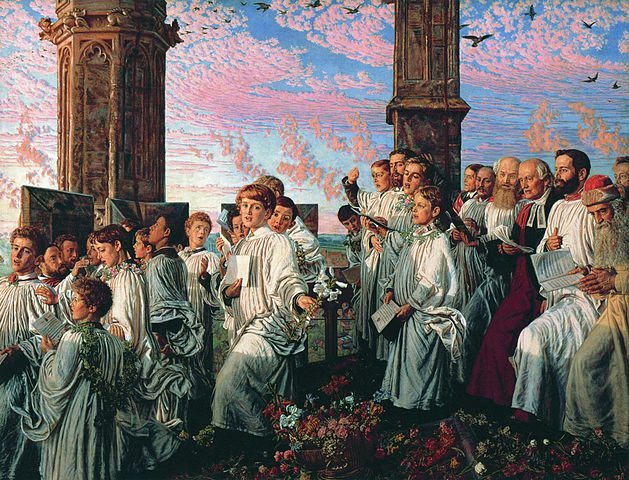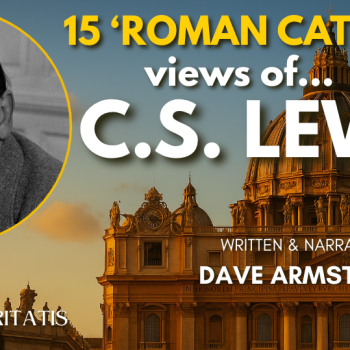
See my previous articles on this book (especially the first), for necessary background:
Dr. Marshall was an Anglican priest prior to 2006. As would have been the case then, once again he (ultimately) accepts neither the authority of popes nor of ecumenical councils, if they happen to clash with his own preconceived views. It’s the Protestant (and “Enlightenment”) principle of private judgment and exaggerated personal autonomy; part and parcel of both heterodox Catholic liberals and of self-consistent Protestants.
I’ve noted this about reactionary thought for many years. They think they are so Catholic: much more than the rest of us poor ignorant peasants (they “get” it; they’re the elite and the cream of the crop: so they constantly tell themselves), but in fact they are steeped in the principles of “do your own thing” / “arbitrarily pick and choose” cafeteria Catholic authority of the very liberal dissident Catholics whom they despise.
Consistent, observant, pious, devout Catholics always exercise the utmost respect for ecumenical councils and for popes (and that does not necessarily reduce to ultramontanism and “papolatry”). They don’t sit around making videos (with all of 13 years of lived Catholicism) mocking and disparaging both councils and popes, and lecturing all the rest of us, as if they possess Catholic authority. It’s a disgrace.
St. Paul and St. James condemned and warned about this sort of thing:
2 Timothy 4:3-4 (RSV) For the time is coming when people will not endure sound teaching, but having itching ears they will accumulate for themselves teachers to suit their own likings,[4] and will turn away from listening to the truth and wander into myths.
1 Timothy 4:7 Have nothing to do with godless and silly myths. Train yourself in godliness;
2 Timothy 2:23 Have nothing to do with stupid, senseless controversies; you know that they breed quarrels.
James 3:1, 6-12 Let not many of you become teachers, my brethren, for you know that we who teach shall be judged with greater strictness. . . . [6] And the tongue is a fire. The tongue is an unrighteous world among our members, staining the whole body, setting on fire the cycle of nature, and set on fire by hell. [7] For every kind of beast and bird, of reptile and sea creature, can be tamed and has been tamed by humankind, [8] but no human being can tame the tongue — a restless evil, full of deadly poison. [9] With it we bless the Lord and Father, and with it we curse men, who are made in the likeness of God. [10] From the same mouth come blessing and cursing. My brethren, this ought not to be so. [11] Does a spring pour forth from the same opening fresh water and brackish? [12] Can a fig tree, my brethren, yield olives, or a grapevine figs? No more can salt water yield fresh.
St. Paul showed more respect for the Jewish high priest who was opposing Christianity, than reactionaries do to popes:
Acts 23:1-5 And Paul, looking intently at the council, said, “Brethren, I have lived before God in all good conscience up to this day.” [2] And the high priest Anani’as commanded those who stood by him to strike him on the mouth. [3] Then Paul said to him, “God shall strike you, you whitewashed wall! Are you sitting to judge me according to the law, and yet contrary to the law you order me to be struck?” [4] Those who stood by said, “Would you revile God’s high priest?” [5] And Paul said, “I did not know, brethren, that he was the high priest; for it is written, `You shall not speak evil of a ruler of your people.'”
A Facebook friend asked me on my Facebook page:
David, is this a fair, even if flippant, summary of your view on Vatican II and the subsequent crises?:
“Nothing bad that happened after the Council can be blamed, even the tiniest smidgen, on the Council, because it never committed heresy or error. Only the good events after the Council can possibly be counted as its fruit.”
Okay. Doesn’t that seem to be just as ideologically possessed as the rad trad point of view? Isn’t it unlikely that the documents are really free of all important defects whatsoever, in view of the subsequent state of the Church? I say: the documents never commit error, but owing to some emphases and ambiguities, the heterodox forces of the Church have been able to derive aid and comfort from the Council (unlike, say, Lateran IV, Trent, or Vatican I). One can be loyal and faithful, and still criticize a council. Right?
Here was my reply:
It comes down to what one believes about ecumenical councils. It’s a matter of faith. Traditionally, Catholics have believed that they are guided by the Holy Spirit. They possess infallible authority if they authoritatively clarify long-held doctrines, in agreement with the pope.
There have always been scoundrels and palace intrigue at every council, because men are sinners. And there has been uproar and confusion after every council, too. If people knew their Church history, they would know this, and the current problems would be put in much better perspective. It’s nothing new. It’s not the end of the Church as we know and love her. St. Paul was struggling with the Corinthian and Galatian churches (even including sexual sin). There is nothing new under the sun. So, for example, Joseph Francis Kelly writes:
This initial ecumenical council foreshadowed elements of many others, one of which was a confused reaction following the council. . . . historically speaking, after councils some participants often have second thoughts about what happened or are surprised at the reaction of others to the council’s work. (The Ecumenical Councils of the Catholic Church: A History, Liturgical Press, 2009, p. 25)
You say heterodox forces didn’t derive comfort from Vatican I? You don’t know your history very well. Have you never heard of the Old Catholics and their rejection of papal infallibility? That was a schism in the Church due to that council. They dissed the council, just as Taylor Marshall is now doing with Vatican II.
This is why indefectibility is such a glorious guarantee. It overcomes the attempts of men to wreck things and destroy the faith. Taylor Marshall and people who think as he does can only see evil men, plots, and (supposedly successful) wicked conspiracies. We are looking at it with the eyes of faith, and see a God Who is much bigger than all that, who can turn around even the worst of situations. Chesterton stated: “at least five times in history the Church has gone to the dogs, but in each case, the dog died.”
Vatican II is completely orthodox and a wonderful exposition of the Catholic faith. It’s an ecumenical council. It has the same authority as Trent (Cardinal Ratzinger stated that in The Ratzinger Report, 1985).
One thing Catholics have believed, too, is that doctrine continues to develop and is ever more understood. Vatican II is completely orthodox and a wonderful exposition of the Catholic faith. It’s an ecumenical council. Catholics believe that doctrine continues to develop and is ever more understood. Blessed Cardinal Newman classically explained that in 1845 in his Essay on the Development of Christian Doctrine (key in my own conversion in 1990). Vatican II is part of that. This is why we love it or should love it. It is the fully developed Mind of the Church in our time, along with the papal encyclicals of the last 60 years, including St. Paul VI’s heroic Humanae Vitae (1968) and St. John Paul II’s magnificent Evangelium Vitae (1995).
Taylor Marshall seems to have a very stunted, limited understanding of these things. And in my opinion, it’s because he has reverted and digressed back to the ecclesiological pablum of his former Anglicanism.
I came into the Church due to the influence of Cardinal Newman, who explained development of doctrine and why the Anglican Church had fundamentally flawed premises. Taylor seems to have a dim comprehension of that, too, or else he would never be tempted to reject essential Catholic things like reverence for popes and the sublime authority of ecumenical councils, and return to the false and half-baked presuppositions of the Anglican slop.
Dr. Marshall is still a Catholic. That’s why it is such a disgrace and scandal. One could handle such bilge if it wasn’t coming from a professed, canonical Catholic. But he’s not thinking as a Catholic should think. This is my point.
So when I say that Taylor has become an Anglican, I mean in spirit, in how he thinks about authority; in important presuppositions that are hostile to Catholicism rightly understood. But he is canonically a Catholic. That’s exactly why I refer to these folks as radical Catholic reactionaries.
***
The twisting of a thing is completely different from the thing itself (throwing the baby out with the bath water). The Bible itself is twisted and distorted and abused all the time. Does it follow that it is a bad thing, to be rejected? Obviously not. I detest the myths about Vatican II that lead to this sort of bilge of people rejecting it altogether, rather than the thinking of folks who lie about what it teaches and pretend that it teaches false notions that it never in fact taught.
***
Lastly, I agree that many groups have tried to infiltrate and subvert the Church. The radical homosexuals are the ones in our day. The liberals have been trying to wreck Catholicism since the French Revolution. My mentor, Servant of God Fr. John A. Hardon, SJ (who received me into the Church and enthusiastically endorsed my first book, A Biblical Defense of Catholicism) said often that modernism is the culmination of all heresies, and that the modernist crisis is the greatest in the history of the Church. I agree 100%!
My response to that, though, is that the Church is led and protected by the Holy Spirit and is indefectible; therefore, all such attempts fail in the long run. Reactionaryism is the counsel of despair. The orthodox Catholic is always hopeful and believes that God is in control and that all things work together for good (Romans 8:28).
Conspiratorialism is a dead-end street; the fool’s way out, and a plain dumb and intellectually naive and vacant interpretation of very complex events and ideas. Much better is traditional Catholic grace-empowered faith: particularly in the indefectibility of the Church, God’s providence, and the scriptural knowledge that sinners are always present in the Church (parable of the wheat and tares, seven churches of Revelation, etc.).
In this vision and way of life, we know and believe that God is always in control and protects Holy Mother Church despite our repeated attempts to bring it down to the dirt and filth of human sin and nefarious aspirations for power, rebellion against God, and all the rest.
***
Photo credit: May Morning on Magdalen Tower (1890), by William Holman Hunt (1827-1910) [public domain / Wikimedia Commons]
***













